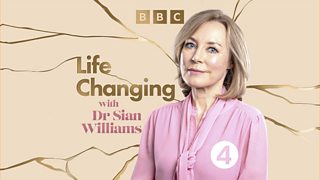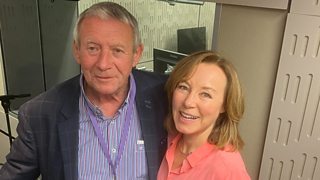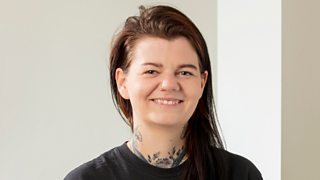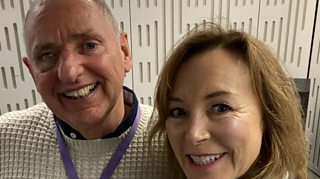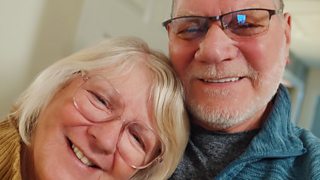I was a bus driver – now I’m a West End star
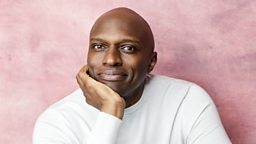
When talented vocalist Phillip Browne became deaf in one ear, he was told by a doctor that his singing career was over, before it had even begun.
Resigned to a different kind of life, he became a London bus driver – until a chance meeting with an old friend pointed him in an extraordinary new direction...
Phillip tells Dr Sian Williams about that Life Changing moment – and his incredible journey to the bright lights of the West End stage.
'The only thing that I wanted to do was music'
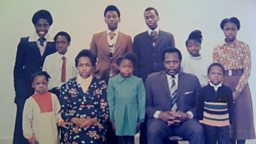
Phillip Browne was born into a large, loving, Windrush-generation family, with four brothers and four sisters in a busy Birmingham household.
“I used to sit at the piano and write songs when all the kids had gone home"
His mum, from Barbados, was a cleaner in a school; his dad, from Saint Kitts, worked for British Rail.
They were members of a local church, where they would go to worship and sing with other Caribbean families.
The family work ethic was strong, but Phillip struggled academically: “I didn't realise that I was dyslexic, but I just knew that I was at school and I couldn't read or write,” he recounts. “The only thing that I wanted to do was music.”
He spent most of his time in the music room which, like church, had a piano: “I used to sit at the piano and write songs when all the kids had gone home.”
When Phillip’s headteacher overheard him singing a song he had composed, he asked him to perform it in assembly.
The young vocalist was nervous – his struggles at school had given him a stutter – but at the end “everyone started cheering and clapping.”
A seed had been planted.
Something 'really special'
Phillip left school with no qualifications. He was working with his brother, as security in a night club, when he decided to have a second crack at getting his basic Maths and English.
"I just loved the fact that someone believed in me"
At college, following some “cool kids” he had spotted, he stumbled upon the Performing Arts Department.
He sat down in a lesson and thought, “Wow, this makes sense to me.”
He managed to get on to the two-year course and “loved it.”
One teacher told him that his voice was “something really special” and offered him free singing lessons every weekend. “
I just loved the fact that someone believed in me,” he admits.
The teacher made an application on Phillip’s behalf, to study opera at the University of Birmingham.
But around that time, he began to hear a ringing in his ear. After two days, the ringing was constant.
A serious infection

By the third day, he had started to lose his balance and went to hospital.
There, he was told that a serious infection was causing a loss of hearing in his right ear; it was touch-and-go as to whether they could save his left.
Still only 19, he remembers being filled with fear that he wouldn’t be able to sing.
When he woke the next morning, he was completely deaf in his right ear.
“I really couldn't walk properly, because the fluid in my ear was all over the place,” he explains.
And although his left ear had been saved, there was a constant crackling. “I couldn't even hear the sound of my own voice.”
He asked the doctor if he would be able to sing again. “No,” he was told. “You can forget about that.”
'I could barely hear the music'
For days, Phillip sat in his room and stared at his cassette deck and headphones, the doctor’s words echoing in his head.
"I was thinking: the only thing I was good at was singing, and it's been taken away"
“I was thinking, the only thing I was good at was singing - and it's been taken away.”
But he was determined. He put his walking stick in the cupboard and ventured out of the house, unaided.
“The whole world sounded different,” he recalls.
Every day he would walk a bit further. Finally, he made back to college.
After finishing his course, he auditioned for a show called Carmen Jones: a musical theatre show, set in WWII, with an all-black cast.
“They offered me first understudy to the boxer, Husky Miller, driving around Europe and doing these shows.”
But Phillip began to have trouble hearing the orchestra.
Three weeks into the tour, he was told he was taking over the role.
“Every night I'd do this song and my heart was just thumping because I could barely hear the music… I thought, when this tour's over, I'm done.”
A new role - on the buses
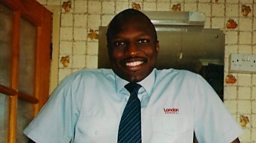
Phillip decided to follow a different path. He moved to London and trained as a bus driver, working out of the Putney bus garage.
“I didn't believe, if I'm honest, that I was really a bus driver"
“I felt like I was playing a role,” he states. “I didn't believe, if I'm honest, that I was really a bus driver.”
He tried, but failed, to get a singing agent. “Eventually I gave up because nobody would take me on. I was just going to work.” Phillip sang at the wheel, but that was all.
Then, years later, walking home from a shift, he bumped into a castmate from Carmen Jones. She now had a part in Mamma Mia, in the West End.
She told Phillip they were holding open auditions for The Lion King, and suggested he give it a shot.
A chance opportunity

Phillip had never even seen a West End show. Driving his bus around Piccadilly Circus, he would watch people spilling in to the theatres and wonder what it was like inside.
"When you're a bus driver, everyone looks like they're having a fantastic time. It's like they're living and you're just helping them live.”
He made up his mind: “I said I'm going to go. No matter what day it is, I'll take a day off work.”
He arrived at the Lyceum Theatre to find a line of hopefuls wrapped right round the building, from stage door to stage door.
After three hours in the queue, it was finally his turn. He stepped in front of the four judges and sang a Nat King Cole song, a cappella.
They told him to come back the following week.
Secret rehearsals
For eight weeks he returned for auditions.
"I used to take my bus uniform off at McDonald's, then... go and audition"
“They said here's some music to learn and here is some script to learn - and it's for Mufasa!"
It was too late to practice in the house when he got back from his shifts at 11pm, so he would take his cassette deck out to the park.
“I'd try and sing this Mufasa song they gave me, but when I started singing, dogs would appear from all over the place!"
Then he spotted the cemetery over the road. “I thought, it's going to be scary, but I want this.”
Before long, he was belting out lines amongst the gravestones.
His confidence growing, he began rehearsing on the bus, in between collecting fares.
He kept it a secret from everyone: “I used to take my bus uniform off at McDonald's on the Strand, then I'd go over to the Lyceum Theatre, go and audition, go back on the buses for Putney,” he explains.
“I used to think if I don't get this job, I'm gonna have to see the Lion King on my own bus.”
He also concealed his deafness.
“I just decided I'm going to have to learn to work with this disability at any cost because I really want to sing,” he states, “so I never, ever spoke about my deafness to anybody.”
A first day of 'joy' and fears
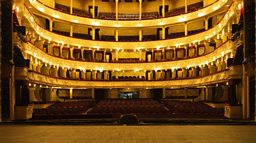
“I remember going to work on the first day. There was a joy that I've never felt in any musical I've ever done since.”
“All I was thinking is, I pray to God that I can hear the music"
As the cast sat in a circle, and the score was handed out, it did not feel real. When they began to sing, his hairs stood on end.
Then the day he had been waiting for arrived.
He was told he would be stepping into the role of Mufasa for three weeks.
“All I was thinking is, I pray to God that I can hear the music,” says Phillip. "That was always in the back of my head. The deafness never leaves you.”
As he stepped up to the stage, he stumbled, but stayed calm.
“I thought, I'm going to own this – and I raised my head up and I thought, I'm Mufasa.”
'I'm Mufasa'
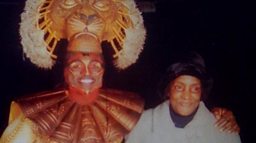
At the end of the first song, the audience erupted.
"As Mufasa says, I remember who I am"
“For me it was like a flashback of the school gates, church, everything.”
He thought about his deafness, his dyslexia, the doctor who told him he would never sing again.
“Everyone's cheering for the show but I was cheering for the past.”
Phillip has now starred in ten West End musicals, but his deafness has remained a secret – until now.
“I've never spoken about being deaf in one ear, in the entire 24 years I've been in musical theatre, until this show today.”
It is a weight off his shoulders. He is ready to own it. “Now, as Mufasa says, I remember who I am.”
-
![]()
Listen to The Singing Bus Driver episode of Life Changing
Phillip Browne shares his incredible journey from London bus driving to West End stardom.
More from Life Changing
-
![]()
Life Changing: I saved 30 people from a sinking ship – but I can’t swim
Lorry driver Larry O’Brien explains how he saved over 30 people from a sinking ferry.
-
![]()
Life Changing: I won £50,000 then gambled it away in seven days
When Stacey Goodwin got a new job, it triggered a destructive gambling addiction.
-
![]()
Life Changing: I was shot in the face and blinded - but stayed positive
Ed Stewart went blind after being shot, but a new - albeit risky operation - offered hope.
-
![]()
Life Changing: The childhood love that survived a 45-year hiatus
How it would take four decades for two children's home friends to find each other again.
